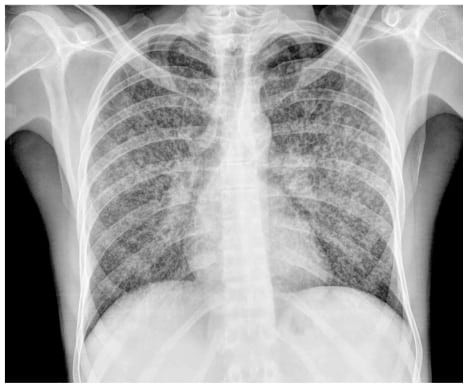Definisi
Analisis cairan pleura adalah pemeriksaan yang dilakukan pada cairan pleura untuk mendiagnosis dan mengobati masalah pada organ paru seperti efusi pleura dan pleuritis.
Kedua organ paru dilindungi oleh selaput pelindung yang disebut pleura. Pleura merupakan organ vital dalam sistem pernapasan. Fungsinya adalah melindungi paru-paru dan mengurangi gesekan yang mungkin terjadi antara paru-paru, tulang rusuk, dan rongga dada.
Masing-masing pleura memiliki dua lapis membran yang menyelubungi paru-paru, yaitu pleura viseral yang melapisi organ paru, dan pleura parietal yang melapisi bagian dalam rongga dada. Di antara dua jenis selaput pleura ini, terbentuklah rongga pleura atau ruang antar pleura.
Pada rongga pleura terdapat cairan pleura yang berfungsi untuk melumasi dan membantu memaksimalkan kontraksi paru saat Anda bernapas. Pada kondisi normal, cairan pada ruang pleura ini hanya berjumlah sedikit, yaitu 0,1-0,2 mL per kilogram berat badan kita.
Namun, terdapat kondisi ketika cairan pleura menjadi terlalu banyak atau menumpuk yaitu efusi pleura. Efusi pleura mengakibatkan paru-paru tidak dapat mengembang sempurna sehingga Anda menjadi sulit untuk bernapas.
Pemeriksaan cairan pleura membantu untuk mencari penyebab terjadinya efusi pleura atau peradangan pada pleura. Selain itu, pemeriksaan ini juga dapat membantu untuk menentukan pengobatan yang tepat.
Analisis cairan pleura umumnya meliputi beberapa pemeriksaan seperti :
- Pemeriksaan kualitas dari cairan pleura secara fisik seperti warna dan kekentalan
- Pemeriksaan kimia untuk mengetahui adanya perubahan komponen kimia dari cairan pleura
- Pemeriksaan analisis mikroskopis untuk mengetahui adanya jamur, bakteri dan komponen lainnya
Indikasi
Pemeriksaan cairan pleura disarankan jika pada pemeriksaan MRI atau rontgen dada dokter menilai adanya penumpukan cairan di paru-paru atau jika Anda mengalami gejala efusi pleura atau pleuritis, seperti:
- Sesak napas
- Nyeri dada yang dirasakan terutama ketika menarik napas dalam
- Batuk
- Demam
Selain itu, pemeriksaan cairan pleura juga dapat dilakukan untuk:
- Menilai ada atau tidaknya sel kanker
- Menilai sel lainnya (seperti sel darah)
- Menilai kadar glukosa, protein, dan zat kimia lainnya
- Menilai adanya bakteri, jamur, virus atau mikroorganisme lain yang menyebabkan infeksi
- Menilai proses peradangan
Baca Juga: Penyakit Pneumonia - Definisi, Penyebab, Gejala, dan Tata Laksana | AI Care (ai-care.id)
Kontraindikasi
Tidak ada kontraindikasi atau kondisi yang membuat seseorang tidak bisa melakukan pemeriksaan ini.
Persiapan Sebelum Pemeriksaan
Tidak ada persiapan khusus sebelum melakukan analisis cairan pleura. Pemeriksaan ini bisa dilakukan dalam keadaan tidak berpuasa. Meskipun demikian, Anda disarankan untuk melakukan konsultasi medis terlebih dahulu kepada dokter sebelum melakukan pemeriksaan analisis cairan pleura sebab ada beberapa kondisi tertentu yang dapat menganggu hasil laboratorium sehingga tidak menggambarkan kondisi Anda yang sesungguhnya.
Informasikan juga kepada dokter jika Anda mengonsumsi obat pengencer darah, seperti aspirin, warfarin atau clopidrogel karena obat tersebut dapat memengaruhi hasil.
Prosedur Pemeriksaan
Pemeriksaan cairan pleura menggunakan sampel cairan pleura, tindakan ini disebut thoracocentesis (thoracentesis). Sampel cairan pleura ini diambil dari rongga pleura di paru-paru dan akan dikumpulkan ke dalam wadah khusus. Petugas laboratorium akan memakai sarung tangan khusus dan APD (Alat Pelindung Diri) saat mengambil sampel pemeriksaan. Biasanya, prosedur pengambilan sampel dilakukan dalam keadaan duduk.
Sebelum mengambil cairan pleura, petugas akan membersihkan area penusukan jarum dengan kasa antiseptik. Petugas juga akan memberikan anestesi atau obat bius untuk menimbulkan efek mati rasa pada kulit sehingga Anda tidak merasakan nyeri saat prosedur pengambilan sampel dilakukan.
Setelah cairan pleura diambil dan dimasukkan ke dalam tabung khusus, petugas akan menekan dan membersihkan area penusukan dengan kasa antiseptik. Prosedur pemeriksaan ini hanya berlangsung selama beberapa menit saja. Sampel cairan pleura yang telah didapatkan akan diperiksakan menggunakan alat khusus di laboratorium, dan hasilnya bisa diketahui dalam beberapa hari kemudian.
Baca Juga: Pemeriksaan Analisis Cairan Otak - Indikasi, Prosedur, dan Hasil Pemeriksaan | AI Care (ai-care.id)
Nilai Normal dan Abnormal
Normalnya, cairan pleura hanya berjumlah < 20 mL (± 4 sendok teh) yang berwarna bening hingga kekuningan. Pada kondisi efusi pleura, terdapat dua jenis hasil dari analisis cairan pleura yaitu transudat dan eksudat, dimana masing-masing jenis dapat menggambarkan penyebabnya.
Transudat
Cairan transudat berwarna jernih, encer, dan memiliki jumlah protein yang rendah. Hal ini disebabkan adanya tekanan pada pembuluh darah. Tekanan ini mengakibatkan bocornya cairan dari pembuluh darah ke rongga pleura. Cairan transudat dapat terjadi karena:
- Gagal jantung
- Penyakit ginjal
- Penyakit hati, seperti sirosis hati
Eksudat
Cairan eksudat berwarna keruh dengan jumlah protein yang tinggi. Hal ini dapat disebabkan beberapa kondisi yang melibatkan peradangan, infeksi, dan kondisi lainnya yang memengaruhi pembuluh darah atau pembuluh limfa. Kondisinya meliputi:
- Pankreatitis
- Penyakit autoimun seperti, rheumatoid artritis dan lupus
- Kanker seperti, leukemia, limfoma, kanker payudara atau paru-paru
- Penyakit paru selain kanker paru seperti, pneumonia atau tuberkulosis
- Trauma dada atau paru-paru
Hasil dan Saran (Pemeriksaan Lanjutan)
Normal
Jika hasil pemeriksaan cairan pleura Anda menunjukkan nilai normal, kemungkinan Anda telah menjalankan pola hidup sehat dengan baik dan tidak ada kelainan yang berhubungan dengan organ paru apabila tidak ada gejala dan tanda klinis tertentu.
Anda disarankan untuk tetap mempertahankan pola hidup sehat Anda saat ini sehingga dapat mencegah penyakit paru, seperti efusi pleura, pleuritis, atau pneumonia yang ditandai dengan ditemukannya parameter yang abnormal.
Abnormal
Jika pemeriksaan cairan pleura menunjukkan hasil yang abnormal, seperti:
- Ditemukannya bakteri atau jamur
- Terdapat sel kanker
- Adanya nanah atau darah
- Ditemukannya cairan limfatik
Sebaiknya Anda segera berkonsultasi dengan dokter. Kemungkinan dokter akan menyarankan perubahan pola makan dan gaya hidup menjadi lebih sehat, atau bahkan juga memulai terapi obat untuk membantu mengatasi gejala yang terkait penyakit paru.
Konsultasikan ke Dokter yang Tepat
Hasil analisis cairan pleura pada orang dewasa dapat dikonsultasikan dengan dokter umum, untuk selanjutnya dilakukan pemeriksaan lanjutan ataupun memulai terapi untuk diagnosis yang sesuai. Anda juga dapat berkonsultasi dengan dokter spesialis paru atau penyakit dalam untuk berdiskusi mengenai masalah cairan pleura Anda lebih jauh. Pada pasien anak, hasil pemeriksaan selain normal harus dikonsultasikan dengan dokter spesialis anak.
Mau tahu informasi seputar hasil pemeriksaan laboratorium, radiologi, dan lainnya? Cek di sini, ya!
- dr Nadia Opmalina
Pleural Fluid Test. (2017). Retrieved 09 January 2023, from https://www.ucsfhealth.org/medical-tests/pleural-fluid-analysis
Pleural Fluid Analysis. (2021). Retrieved 09 January 2023, from https://medlineplus.gov/lab-tests/pleural-fluid-analysis/
Pleural Fluid Analysis. (2022). Retrieved 09 January 2023, from https://www.testing.com/tests/pleural-fluid-testing/
Assessment for Ascites. (2023). Retrieved 09 January 2023, from https://www.cdc.gov/dengue/training/cme/ccm/Assess%20for%20Ascites_F.pdf
Peritoneal Fluid Analysis. (2021). Retrieved 09 January 2023, from https://medlineplus.gov/ency/article/003626.htm












